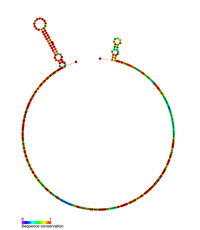Long range pseudoknots
From Wikipedia, the free encyclopedia
| Long range pseudoknot | |
|---|---|
 | |
| Secondary structure of the long range pseudoknot | |
| Identifiers | |
| Symbol | ? |
| Rfam | RF01086 |
| Other data | |
| RNA type | Cis-reg |
| Domain(s) | Eukaryote Prokaryote |
A long range pseudoknot is a pseudoknot containing a long loop region, and may be a mechanism of translational control.
A long range pseudoknot is thought to negatively regulate the translation of the IF3-L35-L20 operon in E. coli. This operon encodes the translation initiation factor IF-3 and ribosomal proteins L35 and L20. In this example, the RNA-RNA interaction occurs between nucleotides separated by a 300 nucleotide loop region.[1]
A long range pseudoknot is also believed to be required for the activity of the Neurospora VS ribozyme.[2]
References
- ↑ Chiaruttini, C; M Milet, M Springer (1996). "A long-range RNA-RNA interaction forms a pseudoknot required for translational control of the IF3-L35-L20 ribosomal protein operon in Escherichia coli". EMBO J. 15 (16) (16): 4402–13. PMC 452164. PMID 8861967.
- ↑ Rastogi, T; T L Beattie, J E Olive, and R A Collins (1996). "A long-range pseudoknot is required for activity of the Neurospora VS ribozyme". EMBO J. 15 (11) (11): 2820–25. PMC 450219. PMID 8654379.
External links
This article is issued from Wikipedia. The text is available under the Creative Commons Attribution/Share Alike; additional terms may apply for the media files.